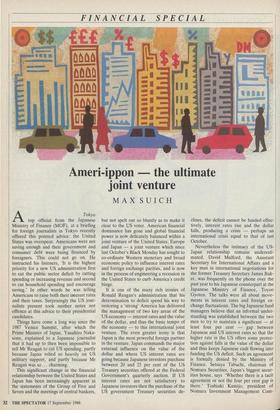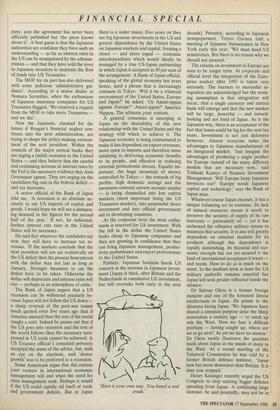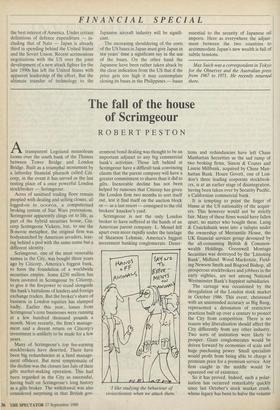FINANCIAL SPECIAL
Ameri-ippon the ultimate joint venture
MAX SUICH
top official from the Japanese Ministry of Finance (MOE), at a briefing for foreign journalists in Tokyo recently offered this pointed advice: the United States was overspent. Americans were not saving enough and their government and consumer debt were being financed by foreigners. This could not go on. He instructed his listeners, 'It is the highest priority for a new US administration first to cut the public sector deficit by cutting spending or increasing revenue and second to cut household spending and encourage saving.' In other words he was telling Americans to raise both their interest rates and their taxes. Surprisingly the US jour- nalists present took neither notes nor offence at this advice to their presidential candidates.
Things have come a long way since the 1987 Venice Summit, after which the Prime Minister of Japan, Yasuhiro Naka- sone, explained to a Japanese journalist that it had up to then been impossible to tell Mr Reagan to cut US spending, partly because Japan relied so heavily on US military support, and partly because Mr Reagan was so ... charming.
This significant change in the financial relationship between the United States and Japan has been increasingly apparent in the statements of the Group of Five and Seven and the meetings of central bankers, but not spelt out so bluntly as to make it clear to the US voter. American financial dominance has gone and global financial power is now delicately balanced within a joint venture of the United States, Europe and Japan — a joint venture which since last October's Black Monday has sought to co-ordinate Western monetary and broad economic policy to influence interest rates and foreign exchange parities, and is now in the process of engineering a recession in the United States to curb America's credit binge.
It is one of the many rich ironies of Ronald Reagan's administration that his determination to deficit spend his way to restoring a 'strong' America has delivered the management of two key areas of the US economy — interest rates and the value of the dollar, and thus the basic tempo of the economy — to this international joint venture. The even greater irony is that Japan is the most powerful foreign partner in the venture. Japan commands the major external influence on the value of the dollar and where US interest rates are going because Japanese investors purchase between 20 and 25 per cent of the US Treasury securities offered at the Federal Government's quarterly auction. If US interest rates are not satisfactory to Japanese investors then the purchase of the US government Treasury securities de- clines, the deficit cannot be funded effec- tively, interest rates rise and the dollar falls, producing a crisis — perhaps an international crisis equal to that of last October.
Nevertheless the intimacy of the US- Japan relationship remains underesti- mated. David Mulford, the Assistant Secretary for International Affairs and a key man in international negotiations for the former Treasury Secretary James Bak- er, was frequently on the phone over the past year to his Japanese counterpart at the Japanese Ministry of Finance, Toyoo Gyoten. The talks were all about move- ments in interest rates and foreign ex- change fluctuations. The big Japanese fund managers believe that an informal under- standing was established between the two men to try to maintain a significant — at least four per cent — gap between Japanese and US interest rates so that the higher rate in the US offers some protec- tion against falls in the value of the dollar and thus keeps Japanese cash flowing into funding the US deficit. Such an agreement is formally denied by the Ministry of Finance. Setsuya Tabuchi, chairman of Nomura Securities, Japan's biggest secur- ities house, says 'Whether there is a tacit agreement or not the four per cent gap is there.' Toshiaki Kamijo, president of Nomura Investment Management Com-
FINANCIAL SPECIAL
pany, says the agreement has never been officially published but 'the press knows about it'. A best guess is that the Japanese authorities are confident they have such an understanding — as far as interest rates in the US can be manipulated by the adminis- tration — and that they have sold the story to Japanese investors to maintain the flow of funds into US Treasuries.
The MOF for its part has also delivered with some judicious 'administrative gui- dance'. According to a senior dealer at Nomura Securities, when the enthusiasm of Japanese insurance companies for US Treasuries flagged, 'We received a request from the MOF to take more Treasuries and we did.'
Now the Japanese, alarmed for the future if Reagan's financial neglect con- tinues into the next administration, are trying to shape the policy-making environ- ment of the next president. Within the councils of the major central banks they are urging a (mild) recession in the United States — and they believe that the careful and continuing increase in interest rates by the Fed is the necessary evidence that Alan Greenspan agrees. They are urging on the candidates big cuts in the federal deficit and tax increases.
A senior official of the Bank of Japan told me, 'A recession is an absolute ne- cessity to cut US imports of capital and goods. I would hope we will see a dampen- ing demand in the figures for the second half of the year.' If not, he indicated, further interest rate rises in the United States will be necessary.
He said that whatever the candidates say now they will have to increase tax re- venues. 'If the markets conclude that the next president will not act realistically on the US deficit then the present honeymoon with the dollar may not last as long as January. Stronger measures to cut the deficit have to be taken. Otherwise the dollar will depreciate and interest rates will rise — perhaps in an atmosphere of crisis.'
The Bank of Japan argues that a US recession can be withstood precisely be- cause Japan will not follow the US down a sharp reversal of the post-war truism much quoted even five years ago that if America sneezed then the rest of the world caught a cold. Indeed he points out that if the US goes into recession and the rest of the world follows then the necessary turn- around in US trade cannot be achieved. A US Treasury official I consulted privately accepted the sense of the advice, but, with an eye on the elections, said 'slower growth' was to be preferred to a recession.
Some Americans argue that this curious joint venture in international economic management will end when the need for crisis management ends. Perhaps it would if the US could rapidly rid itself of trade and government deficits. But in Japan there is a wider vision, Five years on they see big Japanese investments in the US and greater dependence by the United States on Japanese markets and capital, forming a closer — and more equal — economic interdependence which would ideally be managed by a true US-Japan partnership in which Japan is accepted as 50 per cent of the arrangement. A Bank of Japan official, speaking of the global economy ten years hence, used a phrase that is increasingly common in Tokyo: Will it be a trilateral environment of the United States, Europe and Japan?' he asked. 'Or Ameri-ippon against Europe?' Ameri-ippon? America Nippon. The ultimate joint venture.
A general consensus is emerging in Japan on the desirability of this new relationship with die United States and the strategy with which to achieve it. The Japanese economy is being restructured to make it less dependent on export revenues, more open to imports and therefore more satisfying in delivering economic benefits to its peciple, and effective in reducing external protectionist threats. Equally im- portant, the huge mountain of money controlled by Tokyo — the rewards of big profits, high domestic savings and the enormous external current account surplus — is being channelled into key capital markets (most important being the US Treasuries market), into purposeful direct investment and into official government aid to developing countries.
At the corporate level the most enthu- siasm is reserved for US investment. With the fall in the dollar the United States looks cheap to Japanese companies and they are growing in confidence that they can bring Japanese management, produc- tivity performance and export performance to the United States.
Publicly, Japanese business heeds US concern at the increase in Japanese invest- ment (Japan is third, after Britain and the Netherlands in cumulative US investment, but will overtake both early in the next 'Have it your own way. You heard a seal croak.' decade). Privately, according to Japanese newspapermen, Toyoo Gyoten told a meeting of Japanese businessmen in New York early this year, 'We must heed US sensitivities. But there is no reason why we should not proceed.'
The returns on investment in Europe are seen to be longer term. At corporate and official level the integration of the Euro- pean market after 1992 is taken very seriously. The barriers to successful in- tegration are acknowledged but the work- ing assumption is that integration will occur, that a single currency and central bank will emerge and that the new market will be large, powerful — and inward- looking and not fond of Japan. As is the Japanese way, there is an acceptance of the fact that losses could be big for the next ten years. Investment is not just defensive however. Almost everyone notes the advantages to Japanese manufacturers of an integrated market. 'Just imagine the advantages of producing a single product for Europe instead of the many different models that are necessary now,' said Toshiaki Kamijo of Nomura Investment Management. Will Europe keep Japanese investors out? 'Europe needs Japanese capital and technology,' says the Bank of Japan man.
Whatever course Japan chooses, it has a unique balancing act to continue. Its lack of natural resources means it needs to preserve the security of supply of its raw materials — particularly oil — yet it has eschewed the offensive military means to maintain that security. It is also still greatly dependent on external markets for its products although this dependence is rapidly diminishing. Its financial and eco- nomic strength has not yet secured it the kind of international acceptance it wants— and needs. How to do so is much on the mind. In the medium term at least the US military umbrella remains essential but Japan will seek greater influence inside the alliance.
Dr Sabruo Okita is a former foreign minister and one of the foremost liberal intellectuals in Japan. He points to the dilemma facing Japan. 'We Japanese have shared a common purpose since the Meiji restoration a century ago — to catch up wth the West. Now we face a difficult problem — having caught up, where are we to go next? As yet we have no answer.' Dr Okita neatly illustrates the question mark about Japan in the minds of many in the West. At a recent meeting of the Trilateral Commission he was told by a former British defence minister, 'Japan now has more destroyers than Britain. It is time you stopped.'
Henry Kissinger recently urged the US Congress to stop seeking bigger defence spending from Japan. A continuing large increase, he said pointedly, may not be in
FINANCIAL SPECIAL
the best interest of America. Under certain definitions of defence expenditure — in- cluding that of Nato — Japan is already third in spending behind the United States and the Soviet Union. Recent acrimonious negotiations with the US over the joint development of a new attack fighter for the late 1990s has left the United States with apparent leadership of the effort. But the ultimate transfer of technology to the Japanese aircraft industry will be signifi- cant.
The increasing shouldering of the costs of the US bases in Japan must give Japan in ten years' time a significant say in the use of the bases. On the other hand the Japanese have been rather taken aback by the clear indication from the US that if the price gets too high it may contemplate closing its bases in the Philippines — bases essential to the security of Japanese oil imports. Here as everywhere the adjust- ment between the two countries to accommodate Japan's new wealth is full of subtle tensions.
Max Suich was a correspondent in Tokyo for the Observer and the Australian press from 1967 to 1971. He recently returned there.




































































 Previous page
Previous page